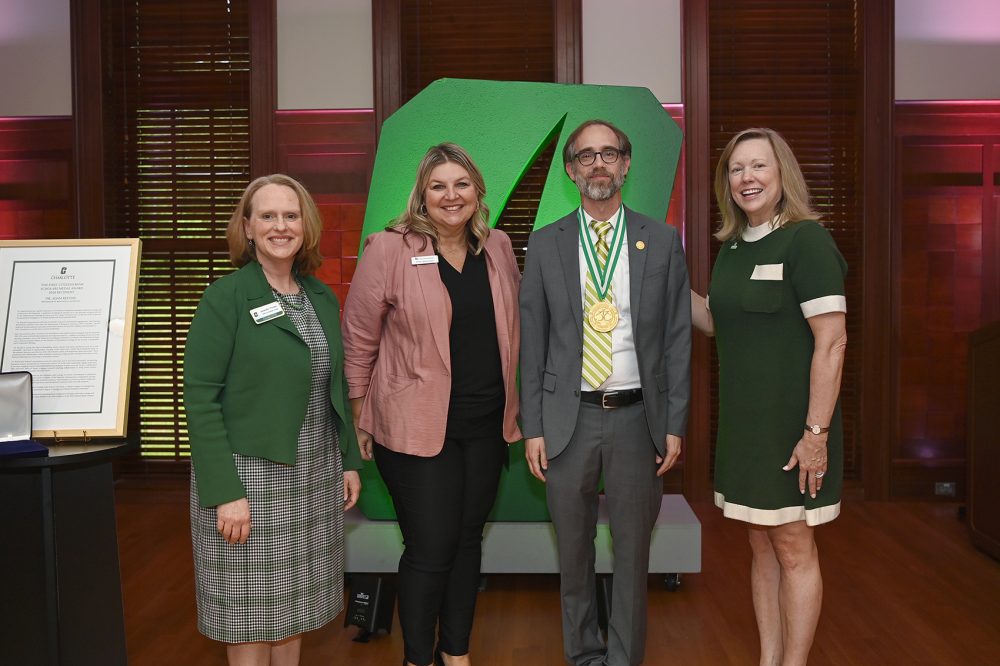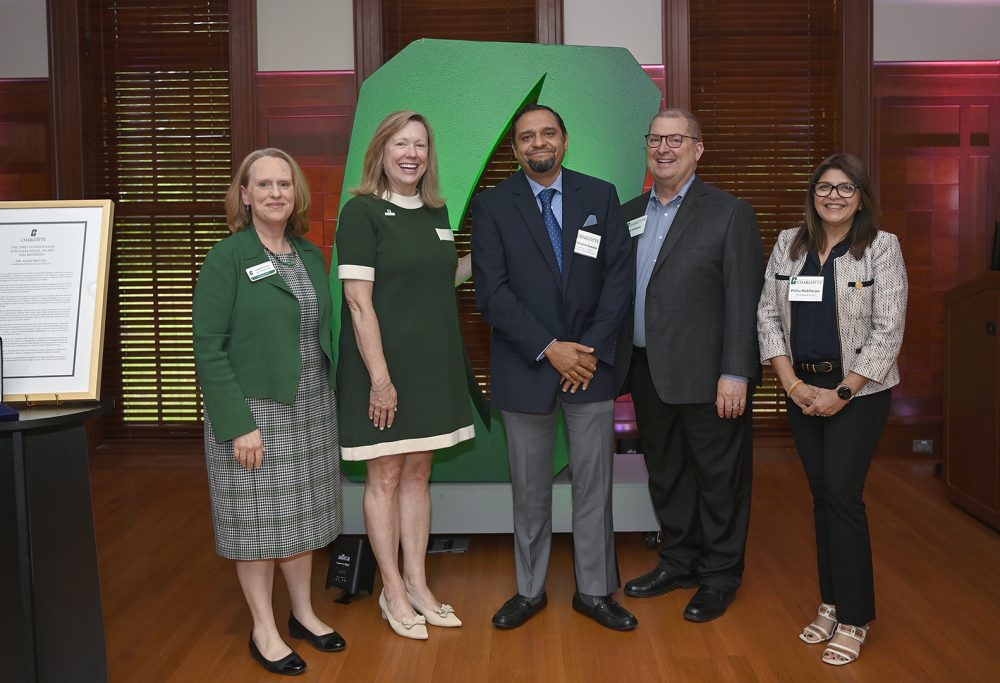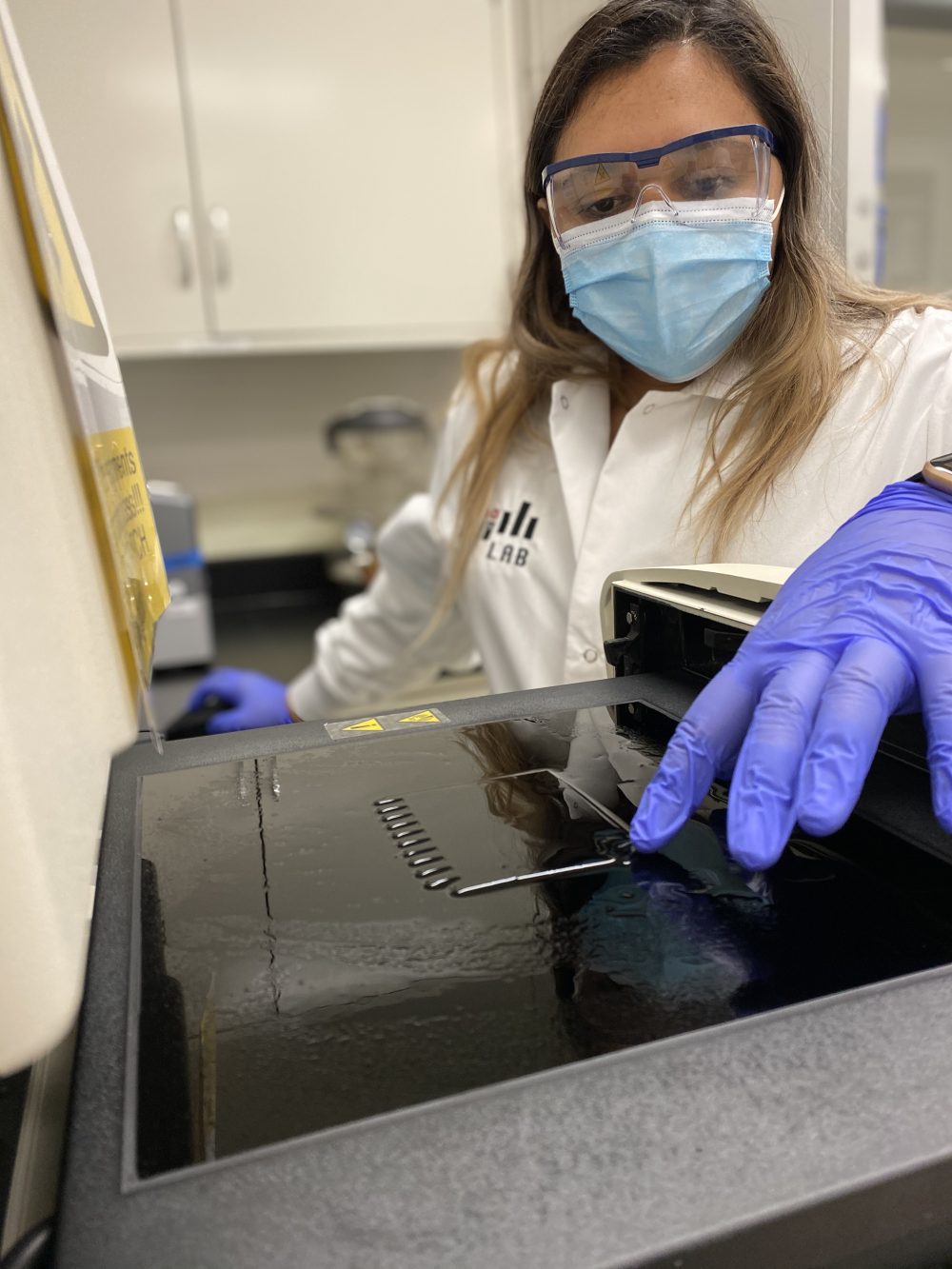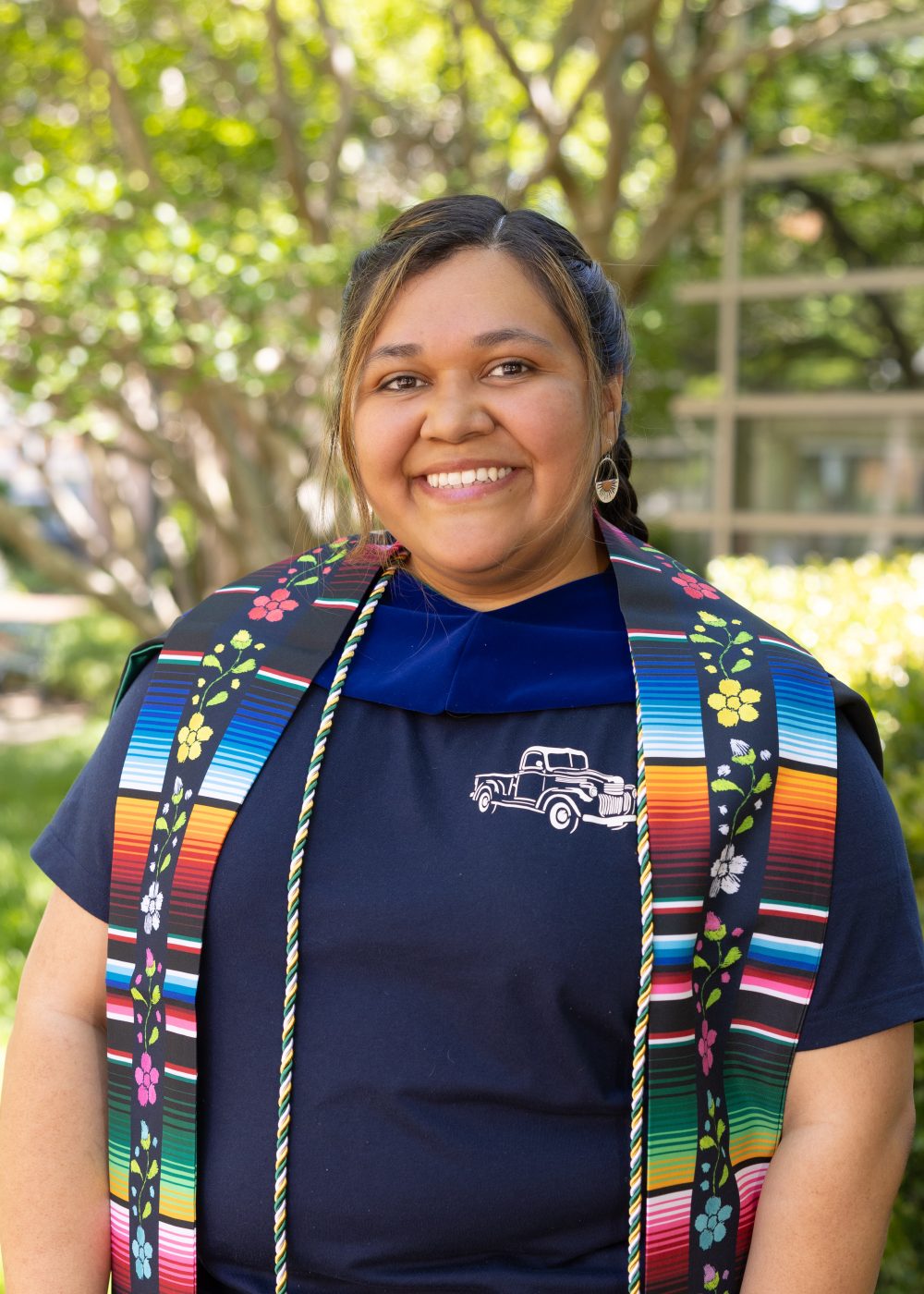Double Major Dhairya Desai Awarded Newman Civic Fellowship
Dhairya Desai, a rising senior and chemistry honors student, has been named a 2024-25 Newman Civic Fellow.
The fellowship is awarded by Campus Compact, a national non-profit and the oldest association in higher education dedicated to civic and community engagement.
Desai is a Levine Scholar working towards a Bachelor of Science in Chemistry and a Bachelor of Science in Biology, with a concentration in biochemistry. As part of the Levine Scholars program, Desai has engaged in community service with Habitat for Humanity and has served as an impact intern with Atrium Health. Desai is planning for a career in medicine.
Read more about Desai’s fellowship.
Jordan Poler Awarded NCInnovation Grant
Jordan Poler, professor of chemistry, has been awarded a grant through a pilot program from NCInnovation. He is one of two UNC Charlotte faculty selected for the funding and among eight researchers chosen from the UNC System.
The grant will allow Poler to expand on his team’s recent innovations in water purification that have led to the creation of patented materials capable of removing harmful compounds more effectively than current market solutions.
At UNC Charlotte, Poler leads a research group that includes students from various disciplines focused on the development of advanced materials.
Poler founded startup naneXPure LLC and will work with Goulston Technologies, based in Monroe, to scale up the drinking water purification materials from bench to industry scale. Poler’s research on water purification materials, which includes the synthesis of polyelectrolytes, novel coordination complexes and nanostructured materials, shows the potential of nanoscale science to create impactful, real-world solutions to improve public health, he said.
Poler, a Fulbright scholar, has previously received grants from the Environmental Protection Agency, the National Science Foundation and the Department of Defense for his research on water purification.
Read more about the grants awarded to UNC Charlotte researchers.
Two College of Science Professors Receive Prestigious University Awards
The UNC Charlotte Faculty Awards Ceremony was held on Monday, May 13 and two College of Science professors were recognized with some of the University’s most prestigious awards.
Adam Reitzel, professor of biological sciences, was awarded the First Citizens Bank Scholars Medal, which recognizes research excellence.
Reitzel serves as the graduate program director for the Department of Biological Sciences and co-director of the Center for Computational Intelligence to Predict Health and Environmental Risks, CIPHER.

“Adam Reitzel offers a model for leadership and research, involving students at every level of his work. He marks the ninth winner of the First Citizens Bank Scholars Medal from the College of Science since the award’s inception, which is an outstanding accomplishment. I am so proud of the leadership our faculty provide, not just within our College, but across UNC Charlotte,” said Bernadette Donovan-Merkert, interim dean of the College of Science.
Juan Vivero-Escoto, professor of chemistry, was awarded the Harshini V. de Silva Graduate Mentor Award, which recognizes mentorship of graduate-level students.

Vivero-Escoto serves as director of the UNC Charlotte Center for Innovation, Translational Research and Applications of Nanostructured Systems, CITRANS.
“Juan Vivero-Escoto offers ceaseless support and mentorship of our students, setting high but individualized expectations for research and professionalism while supporting them every step of the way. Juan really cares about students’ growth and he builds personal connections to put our students first. He teaches important skills, developing the whole student to build their knowledge and craft experiences into a pipeline to launch them into a successful career,” said Donovan-Merkert.
Yelixza Avila: From First-Gen to Postdoc
Growing up in the small West Texas border town of Tornillo, Yelixza Avila viewed military service as her only way to experience life beyond her hometown.
But the first-generation college student persevered in pursuit of higher education, enrolling at nearby Sul Ross State, where she studied biology and chemistry.
“Ten weeks in the summer in West Texas collecting bugs was the best of times and the worst times,” Avila recalled about her research experience in entomology.
She was selected to attend a National Science Foundation Research Experience for Undergraduates at the University of North Texas where she discovered her passion, nano-chemistry.
“Nanotechnology is taking small chemical compounds and combining them to build a particle. Nanoparticles are smaller than the width of your hair. Imagine an ant inside of a football stadium — that’s the scale at which we’re working,” said Avila.

Excited about nanoscale science, Avila googled the topic, finding UNC Charlotte’s NanoSURE program. She read about chemistry professor Kirill Afonin’s work with nucleic acids and nanoparticles. UNC Charlotte’s summer research program deadline had just closed, but Avila emailed Professor Tom Schmedeke, then chair of the program, and explained her desire to contribute to the science. He invited her to apply, and she was accepted and spent summer 2018 at UNC Charlotte before returning to Sul Ross State to complete her undergraduate studies.
At the conclusion of the summer program, Juan Vivero-Escoto, Charlotte professor of chemistry, encouraged Avila to consider graduate school.
Moving away from her family for more than just a summer would be difficult, but she said, “I realized incredible work was taking place at Charlotte, and I wanted to be a part of it. I flew back home to Texas, and I had to ask myself ‘Did that really happen? Was I really a scientist?’ It felt like a dream — the best kind of dream — it was so fun.”
Pursuing a Ph.D.
Avila marveled not only at the notion of being the first in her family to attend college, but of becoming a doctor.
When she learned she had been accepted to Charlotte’s Ph.D. program, Avila knew she would have to sit down with her family to explain why she was making the move. Avila’s family understood her unbridled excitement and offered their loving support.

Expecting to begin doctoral studies in fall 2019, Avila thought she would have months to relocate. Charlotte’s Afonin had other ideas; he invited her to join his lab for the summer, spending time learning from other Ph.D. candidates.
She accepted the offer and absorbed all she could to acclimate herself to this new world. In fall, she started her Ph.D. coursework and taught General Chemistry I and II classes, which Avila credits with strengthening her communication skills.
“In Dr. Afonin’s lab, I worked with DNA and RNA to make nucleic acid nanoparticles, or NANPs. My main research goal was how do we get these NANPs into cells and observe what happens,” said Avila.
Her research became her dissertation proposal, and she was awarded a National Institute of Health predoctoral fellowship in spring 2022. It came at an opportune time, as Avila had another two years of the Ph.D. program and was juggling becoming a first-time mother.
“Getting a Ph.D. is hard, as is being away from family and having a baby during Covid. The only thing that kept me here was this funding. I know external validations shouldn’t count for everything, but a panel of scientists decided to fund me over the next two years,” said Avila.
Avila thrived in Afonin’s lab and is grateful for the opportunity to teach and mentor the next generation of scientists.
Obtaining a postdoctoral fellowship
In March 2024, Avila was selected as an iCURE scholar for a postdoctoral fellowship with the National Cancer Institute. iCURE is an extension of the NCI Center to Reduce Cancer Health Disparities highly competitive and successful extramural Continuing Umbrella of Research Experiences training program. CURE supports the career progression of scholars working toward research independence and fosters the biomedical research pipeline.
It also offers three-year awards for postdoctoral fellows and provides opportunities to work closely with world-class researchers at the National Cancer Institute. Awardees receive support from NCI program staff, access to resources on intramural and extramural funding opportunities, opportunities for professional and career development activities, and connections to an extensive mentoring network. Avila also will receive a stipend as a first-year iCURE postdoc scholar.
Afonin said, “This is a fantastic achievement for Yelixza and a testament to her dedication and capabilities.”

Graduation and the future
Avila’s grandfather died before she defended her Ph.D. dissertation. Her close-knit family was rocked by this event, and Avila went home to grieve and support her family. Avila’s mother made T-shirts in his honor with an image of his truck on the front.
“It’s a ’41 Chevy that he loved to drive us around town. I wanted to bring him along for the ride and honor him in one of the only ways I knew how. So, even though he won’t be in the graduation photos with me and the rest of my family, he’ll still be a part of the memories from this time,” said Avila.
On Saturday May 11, Avila will be hooded in recognition of completing a Ph.D. in nanoscale science; her family will be in attendance.
She is interviewing with research labs that she will join for her postdoc fellowship, but she will carry her family in her heart as she moves to Bethesda, Maryland, with her partner, their son, and three dogs.
“I want to make everything worth it. Every moment away is for them, for my family now,” said Avila. “I’ve been so fortunate, I look into the past, and I was surrounded by amazing mentors who believed in me, until I started to believe in myself.”
Danillo Augusto publishes in Nature Medicine on possible predictive autoantibody for multiple sclerosis
Danillo Augusto, Ph.D., an assistant professor in biology at UNC Charlotte, is co-author of a study published last week in Nature Medicine.
The research points to a significant breakthrough in the understanding and early detection of multiple sclerosis (MS). Researchers have identified a unique autoantibody signature present in approximately 10% of patients with MS years before the onset of clinical symptoms.
The study stated, “These patients exhibit antibody reactivity years before developing MS symptoms and have higher levels of serum neurofilament light (sNfL) compared to profiles of hundreds of patients with MS. This profile is preserved over time, providing molecular evidence for an immunologically active preclinical period years before clinical onset. This autoantibody reactivity was validated in samples from a separate incident MS cohort in both cerebrospinal fluid and serum, where it is highly specific for patients eventually diagnosed with MS.”
Augusto said, “This study sheds light on the preclinical phase of MS and provides a promising avenue for early detection and intervention. Identifying patients at high risk of developing MS before symptom onset could revolutionize patient care and treatment strategies.”
Read more about Danillo Auguto’s study on Inside UNC Charlotte.
16 College of Science Faculty join the ‘Million Dollar Research Circle’
Chancellor Sharon L. Gaber recognized researchers across the University with more than $1 million or more in active external funding at a reception on March 27.
The Million Dollar Research Circle, one of several new initiatives to support research through the Division of Research, honors faculty who have received federal and state grants, as well as grants and awards from business and industry to support research, programs and creative discoveries.
College of Science faculty represented 16 of the total 65 principal investigators honored.
Congratulations to the College of Science faculty in the Million Dollar Research Circle:
Ishwar D. Aggarwal
Kirill A. Afonin
Danillo G. Augusto
Christopher M. Bejger
Anthony M. Fernandes
Jonathan J. Foley
Kristen E. Funk
Ian Marriott
Allison W. McCulloch
Adam M. Reitzel
Bao-Hua Song
Thomas J. Suleski
Andrew Truman
Patricija van Oosten-Hawle
Juan L. Vivero-Escoto
Shan Yan
Shaoyu Li featured as data ‘heavy lifter’
Shaoyu Li is a College of Science associate professor of Mathematics and Statistics and a member of CIPHER, Computational Intelligence to Predict Health and Environmental Risks, research center. Her area of research is statistical genetics and genomics.
She is also an affiliate of the School of Data Science and was featured in an article alongside other UNC Charlotte faculty who manage, research and apply big data. Li and her team are supported by a two-year, National Institutes of Health R01 grant of nearly $600,000, which they are using to research Alzheimer’s Disease.
Read more about Shaoyu Li’s research as a data ‘heavy lifter.’
Chemistry student nominated for Goldwater Scholarship
Juliusz Wieckowski, a junior in the chemistry honors program, is one of two UNC Charlotte students that have been nominated for the 2024 Barry Goldwater Scholarship. The Goldwater is considered one of the top awards for undergraduate U.S. STEM students. The scholarship helps identify the next generation of leaders in scientific, mathematical and engineering research, funding up to $7,500 annually for their education.
Wieckowski is also a student in the Honors College and has participated in undergraduate research with Professors Jay Troutman and Michael Walters.
Zooming in on Nanoparticles
The Afonin Nanotech Lab was featured in the Biomedical Beat blog from the National Institute of General Medical Sciences (NIGMS), part of the National Institute of Health (NIH).
The post entitled “Science Snippet: Zooming in on Nanoparticles” features an explanation of nanoparticles and their biomedical benefits to treat cancers, fight iron deficiencies, treat fungal infections and more.
A video from the Alfonin Lab highlights how nucleic acid nanoparticles (NANPs) are used in immunotherapy to communicate with the innate immune system and launch a protective response. NANP can be folded in different shapes and be used as a molecular language to dictate the scale of the response from the immune system to fight infection and disease.
Accelerated, Multi-Discipline Approach for Prachi Patel
“Accelerated” isn’t just the term for the classes Prachi Patel took starting in middle school, it’s been her whole approach to education. Patel sees life as one big interdisciplinary world, so when she loved everything she was doing and discovered more passions during her fast-track educational journey, she didn’t switch lanes, she simply added on. This December, after just three and a half years of college, Patel is graduating with three degrees: a Bachelor of Science in Math, a Bachelor of Science in Finance, and a Bachelor of Science in Economics.
Growing up, Patel looked up to her older brother, who has both a bachelor’s and master’s degree in computer science from UNC Charlotte, and “he’s the reason why I didn’t do computer science,” she said, laughing. “My brother is a genius– he was building computers in middle school– so I was too intimidated and I thought ‘I can’t do that.’” Little did she know what she was capable of.
“Starting out I didn’t know what I wanted to do, that’s why I did finance, it was general and would get me into the real world, and it’s applicable in a lot of places.” But when considering a minor, her accelerated nature kicked in and she thought “why do a minor when I can just do a major in econ?”
While working on two degrees, Patel wanted to maximize her experience and looked for opportunities to learn outside of the classroom. “My second semester I started working for the library, and then I saw that a TA [teaching assistant] position was open for Calculus I, and I got introduced to Dr. Desire’ Taylor and Dr. John Taylor. I TA’d for them for a good amount of time, and it was Dr. John Taylor that convinced me to do my bachelor’s in math.”
Patel recalled the conversation, and marveled about how it happened. “I told him it’s far too late, I’m in my third year, it is not possible! And he told me to come by his office and let’s see what we can do. So he set up a plan for me, he said ‘you can test out of these classes, but you’re going to need to learn the material in order to do that.’ So, I sat in those classes and I audited them– I even took the tests and did the homework, even though I knew they wouldn’t count– but that was me trying to determine if I knew the material.”
Patel learned the material, and when she was eligible for the Early Entry Program for a Master’s of Science in Mathematical Finance, the Taylors were there again to write her a letter of recommendation. She stacked her classes and kept the pace, even with adding the master’s classes. “I was taking seven classes –they allow 21 credits [per semester]– but I needed more to get my major in math. I was testing out of classes, so I had eight classes at one point with master’s courses, and summer courses while I was working full time. There was a lot.”
“So when I got to Calculus III, I realized I wanted to do engineering. And it’s too late to be switching majors at this point” said Patel, laughing again. “It is so confusing, because I love everything I do.”
Loving everything doesn’t mean that it came easy. Patel worked through learning to code because her internship at Bank of America and co-op at Wells Fargo showed her the need for this critical skill. She struggled in a class to learn C, the programming language, since it was something she stayed away from earlier in her education. Patel said she dropped the class, “wiped my tears,” and picked up a Java class to start with the basics.
Patel built her coding knowledge by learning Java first, and moved on to C again the next semester. “I knew what I was doing and I felt so much better, and realized I definitely could have done computer science. It’s a process; it’s determination. There have been points in my life where I wondered if it was really worth going through all this, but when I think about what I wanted to do, it was all of this. Finance was what I needed for my major, and then I loved econ and I loved math more.”
For now, three bachelor’s degrees will just have to do– until May 2024, when Patel will cross the stage again, next time with her master’s, and for the job offer that’s waiting.